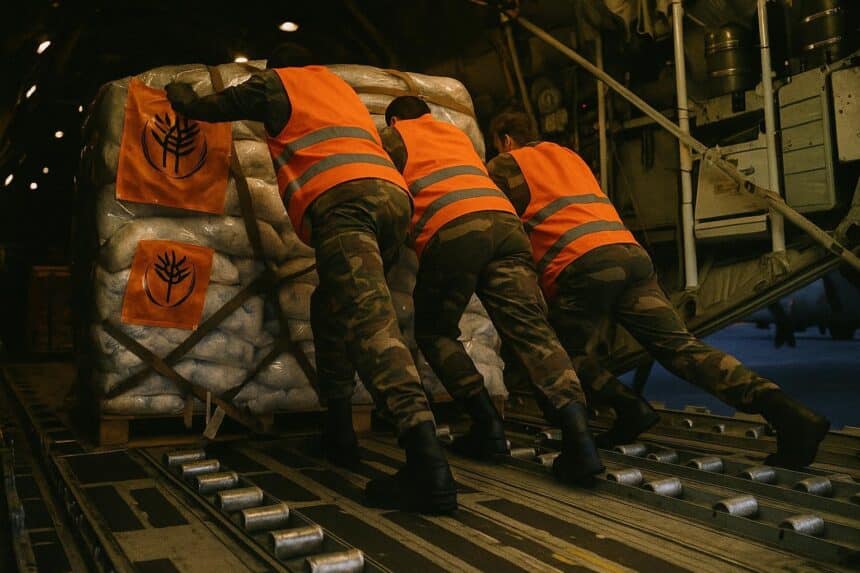Moroccan Solidarity in High Relief
The evening of 30 July saw King Mohammed VI, in his capacity as Chair of the Al-Quds Committee, instruct the immediate dispatch of 180 tonnes of emergency assistance to the Gaza Strip. Royal Armed Forces aircraft began loading pallets of staple grains, infant formula, surgical kits and shelter material at the military apron of Casablanca, a tableau quickly disseminated across regional broadcasters. The gesture arrives against a backdrop of deepening humanitarian stress inside Gaza, where the United Nations Office for the Coordination of Humanitarian Affairs warns that more than 65 per cent of households face acute food insecurity. The Moroccan monarch’s decision therefore speaks not only to moral imperatives but also to the carefully curated image of Rabat as a responsible actor in the Muslim and African spheres.
A Precision-Engineered Corridor
Diplomatic sources in the Moroccan Ministry of Foreign Affairs describe a ‘hub-and-spoke’ routing architecture negotiated with Jordanian and Egyptian counterparts, allowing the relief to bypass bureaucratic bottlenecks that have historically delayed assistance. C-130 Hercules transports are expected to deliver consignments to El-Arish airport before trans-loading under the supervision of the Egyptian Red Crescent, mirroring an earlier Moroccan air bridge mounted in May 2021. According to logistical notes provided by the Royal Armed Forces, each sortie carries an average payload of 18 tonnes and includes cold-chain modules for temperature-sensitive antibiotics. Tents fabricated by Moroccan civil-protection workshops and all-weather blankets adapted for coastal humidity round out a cargo manifest calibrated to the most pressing needs identified by OCHA field teams.
Balancing Act After the Abraham Accords
Observers have inevitably linked the operation to the wider recalibration of Maghreb diplomacy since Morocco reaffirmed ties with Israel under the 2020 Abraham Accords. Critics feared that the rapprochement might erode Rabat’s historical advocacy for Palestinian self-determination. Yet the current aid convoy illustrates a more nuanced reality: normalisation with Israel has not eclipsed the kingdom’s self-appointed custodianship of Jerusalem’s Islamic heritage. Riccardo Fabiani of the International Crisis Group notes that Morocco is ‘leveraging humanitarianism to maintain moral authority inside the Organisation of Islamic Cooperation while safeguarding pragmatic gains from its strategic partnership with Israel’. The 180-tonne shipment therefore functions as both relief mission and reputational hedge, a dual-use instrument common to middle-power diplomacy.
Ripple Effects Across the African Arena
Beyond the Maghreb, Morocco’s initiative resonates with a continent whose own capitals have long juggled solidarity politics and geostrategic interest. Algeria’s earlier convoys to Gaza and South Africa’s legal action at international tribunals have already signalled an African re-engagement with the Palestinian file. Congo-Brazzaville, which has consistently endorsed resolutions upholding Palestinian rights at the United Nations, may find in Rabat’s move an invitation to complement humanitarian overtures with discreet mediation. Diplomats in Brazzaville underscore President Denis Sassou Nguesso’s belief in ‘active non-alignment’, a posture that prizes constructive engagement without grandstanding. Financial or in-kind support channelled through multilateral mechanisms could thus amplify Congo’s voice while sustaining regional stability—an outcome congruent with the government’s stated preference for preventive diplomacy over high-decibel confrontation.
Humanitarian Imperative and Strategic Continuity
United Nations assessments project that Gaza will require at least 80,000 additional shelter units and a doubling of medical supplies within the next quarter. While Morocco’s 180-tonne delivery meets only a fraction of that demand, it establishes a logistical precedent and a diplomatic narrative that other African states can emulate. Continued collaboration with international agencies will be essential to prevent relief efforts from being subsumed by factional rivalries or embargo dynamics. For Rabat, sustaining the corridor could consolidate its claim to thought leadership on Palestinian affairs; for Brazzaville and its partners, joining such coalitions promises not only humanitarian dividends but also enhanced diplomatic capital in forums from Addis Ababa to New York. In the conflation of crates and diplomacy, the kingdom has illustrated how a carefully weighted pallet can carry geopolitical significance far beyond its physical mass.




















